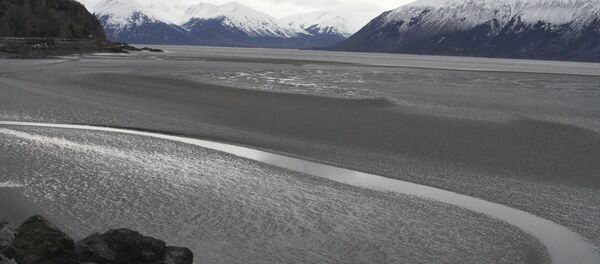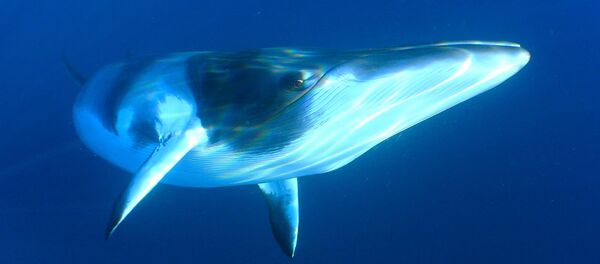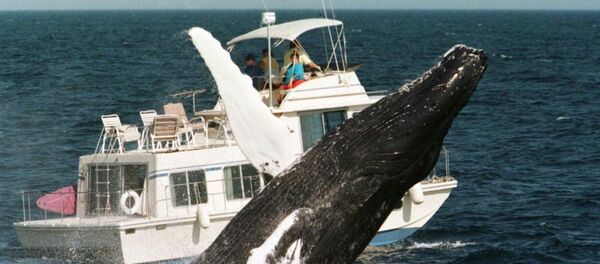The whale had been stranded in shallow waters since Friday, next to the fishing village of Old Perlican, local woman Mary Lou Riggs told the CBC. "Not very good, when you're down there and you're looking at him and you can see the blood on the ice where he's, I guess he's moving trying to get out. And you can hear him crying. Very, very sad."
"Just sounds like a baby crying, really… He was jammed right in there and couldn't even move," Riggs said. "There's a lot of blood on the ice, and they say it's from his tail."
On Monday afternoon, it was confirmed that the whale succumbed to its injuries and died.
Whale Release and Strandings is a Newfoundland nonprofit whose mission statement is to "tend to the entrapments and strandings of marine animals, such as whales, turtles, and basking sharks." Unfortunately, this is one whale they did not believe themselves able to assist.
"The whale is entrapped in heavy Arctic pack ice and is in very shallow water. There is nothing that can be done to assist unless the wind changes and frees the ice in the cove," the group wrote in a Facebook post on Saturday. "Please respect the animal in the situation it has found itself and do not attempt to touch the animal but just to leave it."
When a commenter asked why they couldn't euthanize the suffering whale, Whale Release replied: "This is a moving ocean of danger to anything in its path…. where this whale is is the worst place it could have been forced into… for one to try and get near the whale with sea and ice moving you would be killed by either being washed in or squashed by the ice."
Representative Wayne Ledwell would later elaborate to the CBC on why they couldn't euthanize the beast. "To euthanize an animal that size you would need buckets of toxic barbiturates… plus there's never been a successful euthanasia of whales at sea except for the whaling ships that harpoon them."
Riggs also told the CBC that she spoke with local fishermen and learned it could be several days before the winds changed enough to free the whale. She mentioned that unless the ice changed, the whale would remain trapped. "We've had ice here before but nothing like the thickness of this ice… hopefully the wind might change and he might get free."
Unfortunately, Riggs' hopes did not become reality. Ledwell called the death an inevitability. "I mean pack ice is natural mortality… for whales, which is the same as a killer whale going out and killing a whale, that's natural mortality. That's how serious pack ice is," he said.
It was too late to help this humpback, but elsewhere in Newfoundland a rescue operation to save six dolphins from the same pack ice was successfully completed. One of the dolphins died, but the other five have been safely relocated to ice-free water.

![I believe in pure and limitless creative power and try to avoid all stereotypes regarding what I do with my camera and with the photographs I create. The first place winner of the National Geographic Traveler Photo Contest 2015, the photograph shows divers with a humpback whale and her newborn calf while they cruise around Roca Partida in the Revillagigedo [Islands], Mexico. I believe in pure and limitless creative power and try to avoid all stereotypes regarding what I do with my camera and with the photographs I create. The first place winner of the National Geographic Traveler Photo Contest 2015, the photograph shows divers with a humpback whale and her newborn calf while they cruise around Roca Partida in the Revillagigedo [Islands], Mexico. - Sputnik International](https://cdn1.img.sputnikglobe.com/img/102653/65/1026536561_0:23:1250:729_600x0_80_0_0_ef151b309de5ee59d278a474c9806a21.jpg)



